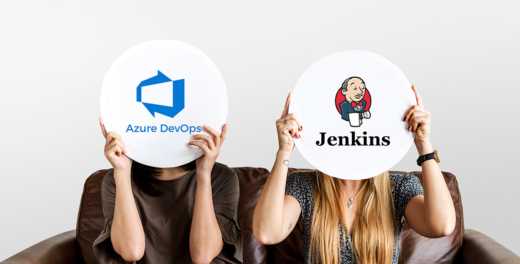Greetings! I'm Aneesh Sreedharan, CEO of 2Hats Logic Solutions. At 2Hats Logic Solutions, we are dedicated to providing technical expertise and resolving your concerns in the world of technology. Our blog page serves as a resource where we share insights and experiences, offering valuable perspectives on your queries.

Azure DevOps and Jenkins in 2024 are crucial to firms that want to smooth their DevOps services. Each platform has unique offerings, so understanding them can enable businesses to make informed choices. This article will dissect the functionalities, advantages, and use cases of Azure DevOps and Jenkins, helping you choose the best option that suits your business requirements.
Overview
Azure DevOps
Azure DevOps is a comprehensive suite of Microsoft development tools that offers end-to-end DevOps capabilities. It integrates seamlessly with Azure services and provides robust tools for planning, developing, delivering, and operating applications.
Jenkins
Jenkins is an open-source automation server widely used for continuous integration and continuous delivery (CI/CD). Known for its flexibility, Jenkins supports many plugins and can be integrated with different tools and technologies.
Comparison of Key Features
Integration
Azure DevOps provides seamless integration with Azure services, making it the perfect choice for businesses already in Microsoft’s ecosystem. On the other hand, Jenkins has an extensive plugin ecosystem that provides flexibility in integrating different tools and platforms.
| Feature | Azure DevOps | Jenkins |
|---|---|---|
| Integration Scope | Seamless with Azure services | Extensive plugin ecosystem |
| Ease of Integration | High for Azure-related tools | High with a variety of tools and platforms through plugins |
| Flexibility | Moderate (focused on Microsoft tools) | High (supports diverse tools and platforms) |
| Configuration Effort | Low (managed integration) | Moderate to High (requires setup of plugins) |
Setup and Maintenance
Azure DevOps is a managed service that makes it easier to get started and requires less maintenance. While Jenkins is a free tool that requires manual installation and maintenance, it offers more control.
| Feature | Azure DevOps | Jenkins |
| Setup Process | Easy (managed services) | Manual and potentially complex |
| Maintenance Effort | Low (automated by Azure) | High (requires manual updates and management) |
| Control Over Environment | Moderate (limited by managed services) | High (full control and customization) |
| Time Investment | Minimal (focus on development) | Significant (dedicated maintenance required) |
Scalability
Azure DevOps scales effortlessly through cloud support, making it appropriate for any type or size of business. Likewise, while Jenkins can scale up, it still needs careful configuration and resource management.
| Feature | Azure DevOps | Jenkins |
| Scalability Approach | Cloud-based, automatic scaling | Manual configuration required |
| Ease of Scaling | Easy (leverages Azure cloud) | Moderate to complex (requires setup) |
| Resource Management | Handled by Azure | Requires careful management |
| Suitability for Business Size | Suitable for all sizes | Suitable for all sizes with configuration |
| Effort Required | Minimal (automatic) | Significant (manual setup and management) |
Security
Azure DevOps includes built-in security features, ensuring robust protection for your projects. Jenkins relies on plugins for security, which can be effective but require proper setup and monitoring to ensure safety.
| Feature | Azure DevOps | Jenkins |
| Security Approach | Built-in security features | Plugin-based security |
| Ease of Security Management | Easy (minimal configuration) | Requires manual setup and monitoring |
| Access Control | Role-based access control (RBAC) | Managed through plugins |
| Threat Detection | Advanced threat detection integrated | Depends on plugins and configurations |
| Identity Management | Integrated with Azure Active Directory | Customizable through plugins |
| Configuration Effort | Low (automatic security features) | High (requires careful setup and updates) |
Cost
Azure DevOps employs a subscription-based model, which can be very economical when dealing with businesses utilizing other Azure services. In contrast, Jenkins is an open-source tool, meaning businesses should consider infrastructure and maintenance costs.
| Feature | Azure DevOps | Jenkins |
| Pricing Model | Subscription-based | Open-source (free) |
| Software Cost | Subscription fee | Free |
| Infrastructure Cost | Included in subscription | Additional (server, storage, etc.) |
| Maintenance Cost | Included in subscription | Additional (setup, updates, maintenance) |
| Cost Predictability | High (fixed subscription fees) | Variable (depends on infrastructure and maintenance needs) |
| Support Costs | Included in subscription | Community support (free), third-party support (additional cost) |
Support
Microsoft supports Azure DevOps and has an active community. Jenkins is heavily community-supported and documented but lacks professional support unless through third-party services.
| Feature | Azure DevOps | Jenkins |
| Primary Support | Microsoft support | Community support |
| Professional Assistance | Included with subscription | Available through third-party services |
| Documentation | Extensive and provided by Microsoft | Extensive and community-driven |
| Community Resources | Active user and developer community | The large and active open-source community |
| Support Cost | Included in subscription | Free (community), additional cost for third-party support |
| Response Time | Fast (professional support) | Variable (community and third-party) |
Customization
Jenkins, with its wide plugin ecosystem, can be customized for many different project requirements. Azure DevOps offers a more streamlined suite of tools that reduces customizability but increases usability.
| Feature | Azure DevOps | Jenkins |
| Customization Approach | Streamlined tools and extensions | Vast plugin ecosystem |
| Ease of Use | High (integrated tools) | Moderate (requires setup and management) |
| Flexibility | Moderate (within provided tools) | High (supports diverse needs) |
| Plugin Availability | Limited (focused on key integrations) | Extensive (over a thousand plugins) |
| Setup Complexity | Low (minimal configuration needed) | High (requires manual setup of plugins) |
| Maintenance Effort | Low (managed by Azure) | High (ongoing management required) |
Usability
Azure DevOps has a user-friendly interface that makes it easy for technical or non-technical teams. Jenkins is resource-intensive in terms of technical expertise and may require special training.
| Feature | Azure DevOps | Jenkins |
| Interface | User-friendly and intuitive | Functional but requires technical understanding |
| Accessibility | Suitable for varying technical expertise | Requires technical proficiency |
| Learning Curve | Low (easy adoption) | High (steep learning curve) |
| Training Needs | Minimal (basic usage) | Significant (advanced setup and usage) |
| Task Management | Integrated and straightforward | Modular but requires configuration |
| Support Resources | Extensive documentation and support | Community-driven resources |
CI/CD Capabilities
Both Azure DevOps and Jenkins excel in CI/CD capabilities. Azure DevOps provides an integrated pipeline that’s easy to configure and manage. Jenkins, with its robust CI/CD features and extensive plug-in support, handles various complex workflows efficiently.
| Feature | Azure DevOps | Jenkins |
| Automation | Integrated pipelines | Plugin-based customization |
| Ease of Setup | Simple with pre-built templates | Requires configuration and plugin setup |
| Flexibility | Moderate (pre-defined tasks and templates) | High (customizable through plugins) |
| Support for Workflows | Agile development methodologies | Supports complex and varied workflows |
| Scripting Requirement | Minimal (uses visual pipelines) | Moderate to High (scripting flexibility) |
| Integration Capabilities | Native integration with Azure services | Extensive plugin support |
Conclusion
The choice between Azure DevOps and Jenkins depends on your business needs and infrastructure. If you’re highly invested in the Microsoft ecosystem and prefer a managed service with strong support, then Azure DevOps is a compelling choice. For those businesses seeking flexibility, customization, and an open-source solution, Jenkins stands out as the premier tool.
While taking this decision in 2024, keeping strategic goals and operational requirements in mind, enterprises should observe the integration, setting up, scalability, security features, cost, and after-sale support extending to customization, usability, and CI/CD capabilities.
Table of contents

Related Articles





